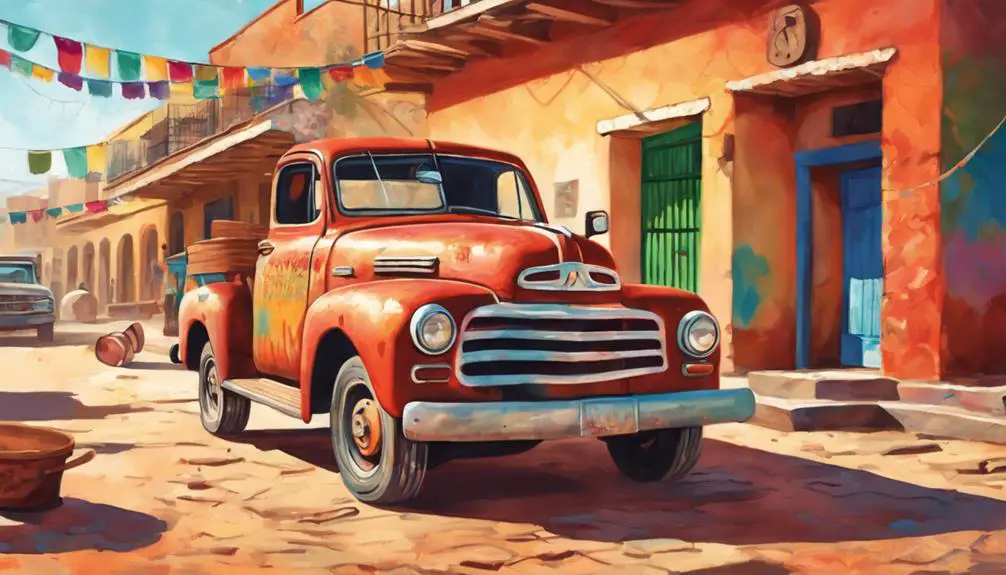You're looking for the Spanish slang terms for pickup trucks. In Latin America, these vehicles have earned colorful nicknames that reflect their ruggedness, versatility, and cultural significance. In Mexico, it's "troca," while in El Salvador, it's "picop." These terms aren't just random words – they represent the pickup truck's role in rural life, symbolizing rugged individualism, strong work ethic, and connection to the land. As you explore the world of pickup trucks in Latin America, you'll discover more about the cultural significance behind these slang terms and how they vary across regions.
Origins of Pickup Truck Nicknames
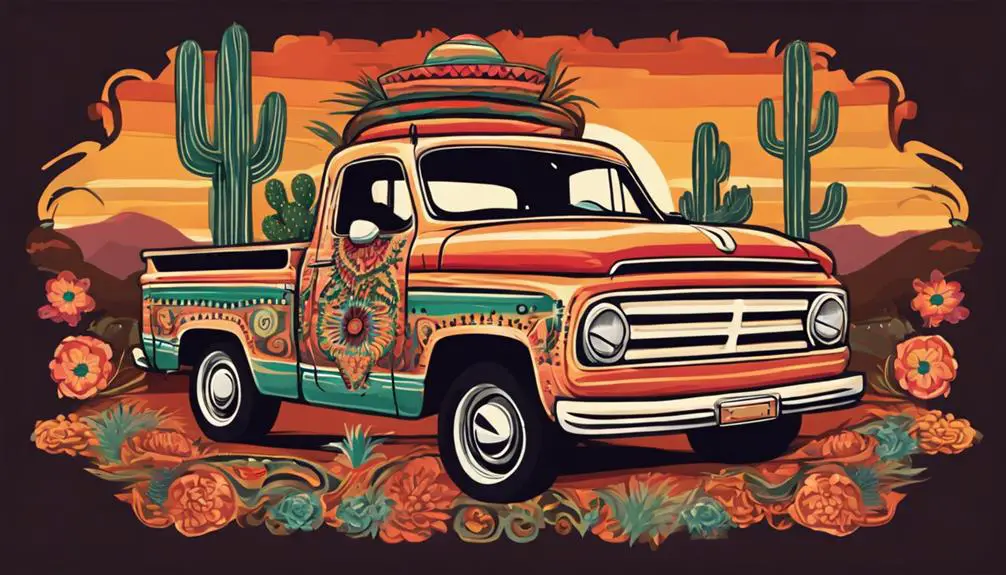
Let's explore the historical background and cultural significance of these monikers in Latin American countries, particularly in Mexico and Central America, where pickup trucks have earned a variety of colorful nicknames that reflect their ruggedness, versatility, and widespread use.
You might wonder where these nicknames came from. The early adoption of pickup trucks in rural areas led to their integration into daily life, earning them affectionate nicknames. Vintage ads from the mid-20th century often featured pickup trucks as symbols of strength and reliability, further solidifying their status in Latin American culture.
Folk etymology suggests that some nicknames originated from wordplay, such as 'troca' in Mexico, which is believed to come from the Spanish word 'trocar,' meaning 'to exchange' or 'to swap.' This nickname may have originated from the truck's ability to transport goods and people between rural areas and cities.
Understanding the nickname origins provides insight into the cultural significance of pickup trucks in Latin America.
Troca: The Mexican Workhorse
What makes the troca, a humble pickup truck, an indispensable workhorse in Mexico's rural landscape? You might be surprised to learn that this unassuming vehicle is the backbone of rural transportation in the Mexican countryside. From hauling crops to transporting livestock, the troca is an essential tool for many farmers and ranchers.
| Feature | Description |
|---|---|
| Payload Capacity | Up to 1 ton of cargo, ideal for transporting produce and livestock |
| Ground Clearance | High clearance for traversing rough terrain and dirt roads |
| Fuel Efficiency | Reliable and fuel-efficient engines for long trips across rural areas |
As you explore the Mexican countryside, you'll notice that the troca is an integral part of daily life. It's not uncommon to see trocas loaded with fresh produce, tools, or even people, traversing the winding roads and dirt pathways of rural Mexico. The troca's versatility, reliability, and ruggedness have earned it a special place in the hearts of many Mexicans, making it an iconic symbol of rural transportation.
Picop: El Salvador's Rugged Ride
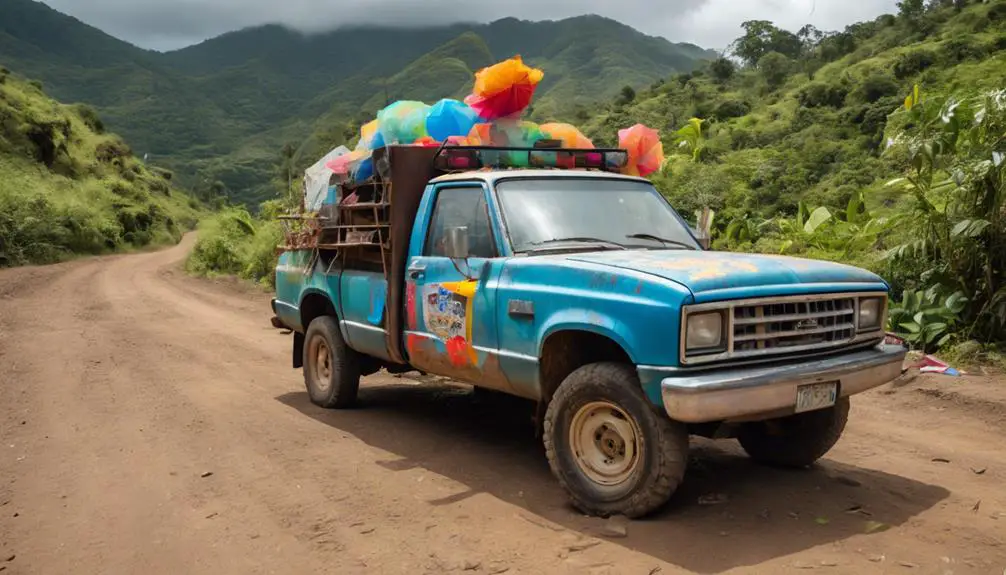
You'll find the picop, a sturdy pickup truck, conquering El Salvador's rugged terrain, where its reliability and strength have made it a staple in rural areas. As a trusted workhorse, the picop is an essential tool for rural transport, traversing dirt roads and rough trails with ease. Its ruggedness and durability make it an ideal choice for farmers, construction workers, and entrepreneurs who need to haul heavy loads across the countryside.
When you're not hauling goods, the picop is perfect for coastal cruising, offering a comfortable ride along El Salvador's scenic Pacific coast. With its powerful engine and sturdy suspension, you can tackle rough roads and enjoy the ocean views without worrying about the truck's performance.
Whether you're commuting to work or enjoying a weekend getaway, the picop is the perfect companion for any adventure. Its reputation for reliability and strength has earned it a loyal following in El Salvador, making it a common sight on rural roads and coastal highways.
Latin American Pickup Culture
Throughout Latin America, pickup trucks have become an integral part of the cultural landscape, symbolizing rugged individualism and a strong work ethic. You'll notice that in many rural areas, pickup trucks are a staple, reflecting the region's Latin Roots and Country Pride.
The Off Road Lifestyle is deeply ingrained in the rural identity, where pickup trucks are essential for traversing rough terrain and completing daily tasks.
In many Latin American countries, pickup trucks are a symbol of status, representing a connection to the land and a self-sufficient lifestyle. You'll often see pickup trucks adorned with stickers or decals that express pride in one's heritage or region. This cultural phenomenon is rooted in the history of agriculture and rural development, where pickup trucks played a vital role in the economic growth of these countries.
As you explore the rural areas of Latin America, you'll notice that pickup trucks are an integral part of the rural identity. They're used for hauling goods, transporting people, and traversing the rugged terrain of the countryside. The pickup truck has become an iconic symbol of Latin American culture, reflecting the region's values of hard work, resilience, and self-reliance.
The Symbolism of Rugged Individualism
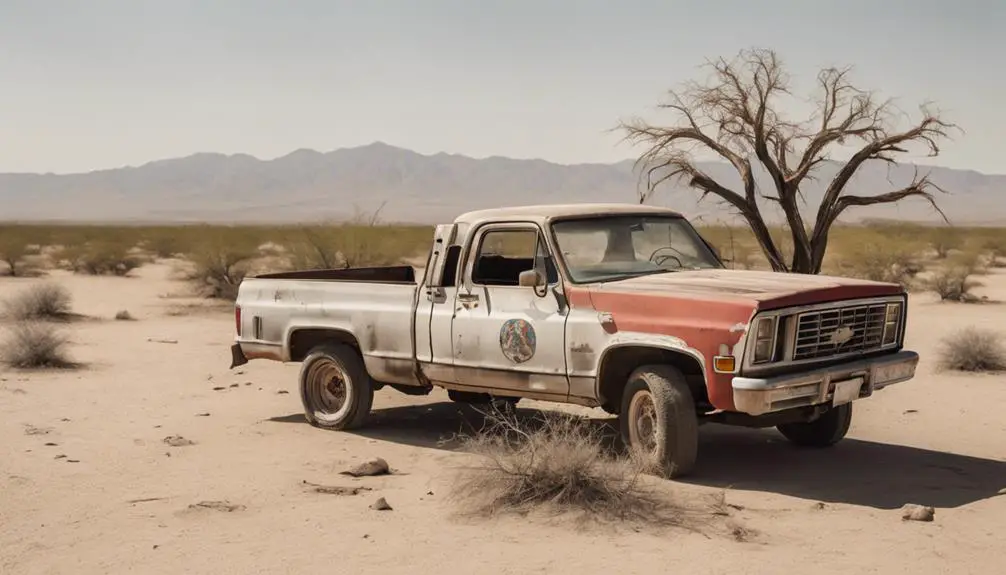
In the Latin American cultural narrative, the pickup truck embodies rugged individualism, symbolizing a strong work ethic, self-reliance, and independence. You might associate this with the classic American identity, but in Latin America, it takes on a unique flavor. The pickup truck represents a connection to the land, a resourcefulness, and a can-do attitude reminiscent of the American frontier spirit.
As you explore the cultural significance of pickup trucks in Latin America, you'll notice that they're often associated with rural areas, where they're essential for daily life. This reinforces the idea of self-sufficiency and autonomy, values deeply ingrained in the region's cultural psyche. You'll often see pickup trucks adorned with decals or stickers, proclaiming the owner's pride in their work, their land, or their community.
The symbolism of rugged individualism is closely tied to the idea of independence and self-reliance. In Latin America, the pickup truck has become an extension of this concept, representing a way of life that's deeply rooted in the region's history and culture.
As you explore further into the cultural significance of pickup trucks, you'll find that they're more than just vehicles – they're symbols of resilience, hard work, and a connection to the land.
Regional Variations in Slang
Two distinct regional variations of slang emerge in Latin America, reflecting the diverse cultural heritage of the region. As you explore the nuances of pickup truck slang, you'll notice that different regions have developed unique dialects and argot. This phenomenon is rooted in the complex Dialect Dynamics that have shaped the Latin American linguistic landscape.
| Region | Slang Terms for Pickup Trucks |
|---|---|
| Mexico | 'Ranchera' or 'Camioneta' |
| Argentina | 'Camión' or 'Pickup' |
| Chile | 'Pickup' or 'Camioneta' |
| Colombia | 'Camioneta' or 'Ranchera' |
| Peru | 'Camión' or 'Pickup' |
The Argot Atlas, a detailed linguistic resource, highlights the regional variations in slang usage. For instance, in Mexico, a pickup truck is often referred to as a 'Ranchera,' whereas in Argentina, it's commonly known as a 'Camión.' These regional differences underscore the dynamic nature of language, shaped by cultural, historical, and geographical factors. By recognizing these variations, you'll gain a deeper understanding of the complex cultural tapestry that underlies pickup truck slang in Latin America.
The Evolution of Pickup Truck Lingo
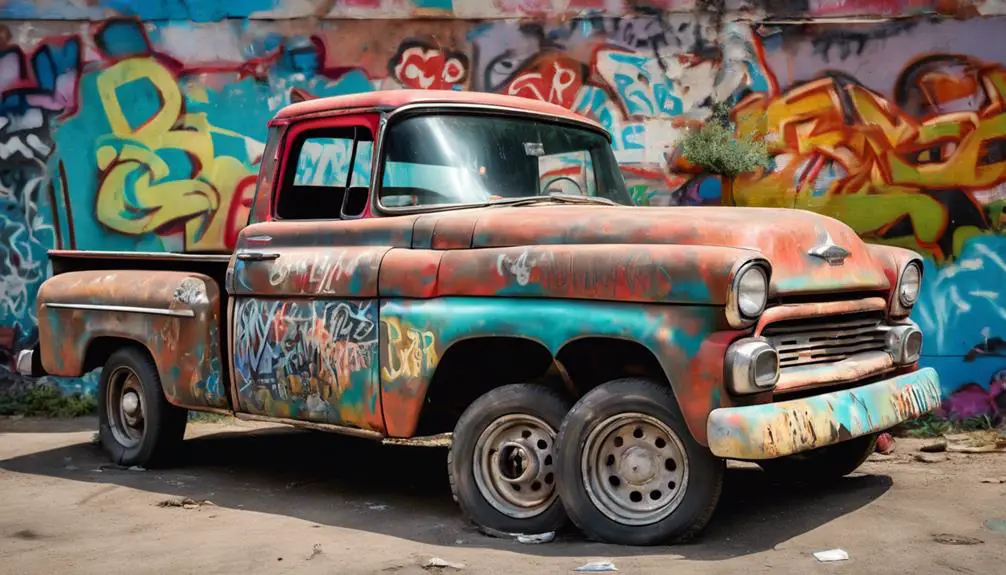
As you explore the nuances of pickup truck slang, you'll discover that its evolution parallels the historical development of the vehicles themselves. From humble beginnings as utilitarian workhorses to today's high-performance, tech-laden machines, pickup trucks have undergone a transformation that's mirrored in the language used to describe them.
The early 20th century saw the rise of pickup trucks as a symbol of rural American ingenuity, with terms like 'truck' and 'pickup' emerging to describe these versatile vehicles. As urbanization and cultural exchange accelerated, a language shift occurred, with Spanish-speaking communities adopting and adapting pickup truck terminology. This cultural fusion led to the creation of unique slang terms, such as 'troca' in Mexico and 'camioneta' in Spain.
As the global pickup truck market continues to expand, you'll notice a blending of linguistic and cultural influences. This evolution of pickup truck lingo reflects the vehicles' growing importance in diverse cultural contexts, from rural America to urban Latin America. By examining the language used to describe pickup trucks, you'll gain insight into the complex dynamics of cultural fusion and language shift.
Frequently Asked Questions
Can Pickup Trucks in Latin America Be Used for Off-Road Adventures?
You're wondering if pickup trucks in Latin America can handle off-road adventures. As Rural Explorers and Mountain Conquerors, you'll be pleased to know that many models are designed for rugged terrain.
With four-wheel drive capabilities and high ground clearance, you'll be able to navigate rough roads and steep inclines. Additionally, many trucks come equipped with features like locking differentials and skid plates, making them ideal for tackling challenging off-road routes.
Are Pickup Trucks in Spanish-Speaking Countries Mainly Used for Work?
As you explore the role of pickup trucks in Spanish-speaking countries, you'll find they're mainly used for work, particularly in rural areas where the economy relies heavily on agriculture and livestock. In contrast, urban dwellers often view pickups as a status symbol, reflecting their wealth and power.
However, in rural areas, these vehicles are essential tools for farmers, ranchers, and construction workers, facilitating their daily operations and supporting the local economy.
Do Pickup Trucks Have a Cultural Significance in Latin American Societies?
You'll find that in many Latin American societies, pickup trucks hold significant cultural value, extending beyond mere utility. They're often seen as a symbol of social status, reflecting a person's economic standing.
Additionally, pickup trucks can be deeply rooted in family heritage, passed down through generations as a trusted workhorse. This emotional attachment transcends functionality, making them an integral part of the cultural fabric.
As you explore the region, you'll notice how pickup trucks are woven into the social fabric, reflecting the community's values and traditions.
Can Pickup Trucks Be Customized With Unique Features in Latin America?
You're curious about customizing pickup trucks in Latin America. Yes, you can definitely upgrade your ride with unique features.
In Latin America, you'll find shops offering bespoke services. You can opt for unique interiors, such as premium leather seats or custom trim.
Additionally, custom paintjobs are popular, allowing you to personalize your truck's exterior with bold designs or vibrant colors.
With the right shop, the possibilities are endless, and your truck will stand out from the crowd.
Are There Specific Safety Features Required for Pickup Trucks in Latin America?
You're looking into safety features for pickup trucks in Latin America. Crash testing and airbag regulations are essential aspects to examine.
In Latin America, countries have varying regulations, but many follow UN Regulations or European New Car Assessment Programme (Euro NCAP) standards.
For instance, Brazil and Argentina require frontal and side impact crash testing, while Mexico adheres to UN Regulations for airbag installations.
You'll need to research specific country regulations to guarantee compliance.
Conclusion
Investigating the origins of pickup truck nicknames in Spanish slang reveals a fascinating cultural phenomenon. The theory that regional variations in slang reflect local values and lifestyles holds true.
Troca, Mexico's rugged workhorse, and Picop, El Salvador's trusted ride, exemplify the symbolism of rugged individualism.
As pickup truck culture evolves, so does its lingo, shaped by regional identity and shared experiences. This linguistic adaptation underscores the significance of pickup trucks in Latin American culture, embodying resilience, hard work, and independence.

